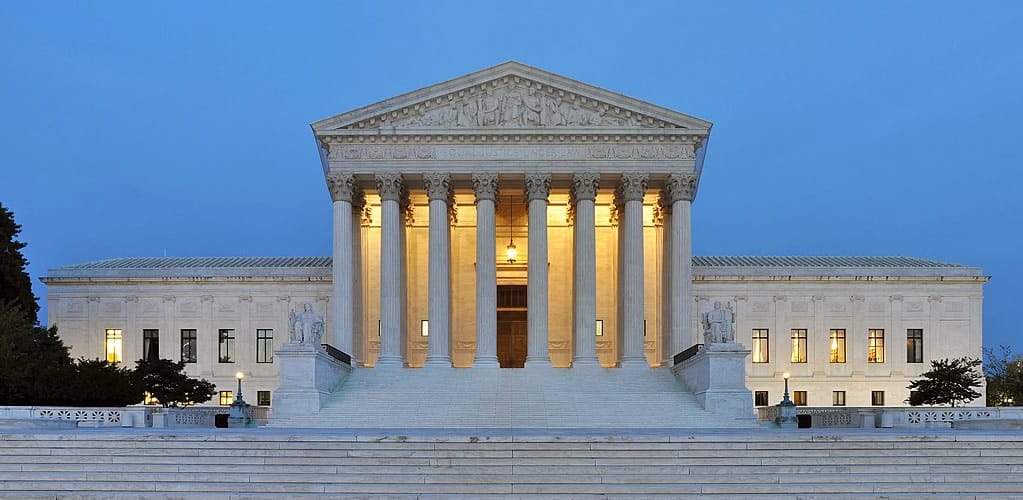Proof it’s the Supreme Court of ideology not a Supreme Court of law
A rare occurrence in American jurisprudence took place last month that reflects both the hope and doom of small democratic law in America.

A rare occurrence in American jurisprudence took place last month that reflects both the hope and doom of small democratic law in America.
First published: Oct 2022.
Hope because it’s proof American lower courts are still courts of law, doom because it’s proof that the U.S. Supreme Court is a court of ideology and not a court of law.
This past June the U.S. Supreme Court agreed to hear Moore v. Harper next year in 2023. The fact that the Supreme Court agreed to hear Moore v Harper is proof alone that the Supreme Court has become a court of ideology. Because the decision by the justices will decide if an ideology, the Independent State Legislature Doctrine (ISL), allows America’s 50 politically partisan state legislatures to set the rules for federal elections, free of supervision from their state courts, free from regulation by their state constitution, and regardless of what citizens have voted for in a state referendum.
Proponents of the ISL ideology believe that state legislatures are free to create any federal election laws within their state, regardless of whether or not it violates their state’s constitution, regardless of what their state’s governor, their state’s executive bureaucracy, their state’s judicial system, or any decision voted for by citizens of their state have to say about it. Historically the ISL has never been the basis of any legal opinion issued by the U.S. Supreme Court, and the one time the question of its constitutionally was placed before the Supreme Court, in Arizona State Legislature v. Arizona Independent Redistricting Commission, it was rejected in a 5-4 decision.
The 2015 decision of the five court of law justices, written by former Justice Ruth Bader Ginsburg, stated that “redistricting is a legislative function to be performed in accordance with the State’s prescriptions for lawmaking, which may include the referendum and the Governor’s veto”. Unfortunately for the traditional rule of American constitutional law in 2022 the 2015 U.S. Supreme Court of law no longer exists. The 3 court of ideology justices who dissented in the 2015 decision, Justices John Roberts, Clarence Thomas, and Samuel Alito have been joined by 3 new court of ideology justices, Neil Gorsuch, Brett Kavanaugh, and Amy Coney Barrett who replaced 3 of the 2015 court of law justices. Transforming the 2015 U.S. Supreme Court of law into the 2022 U.S. Supreme Court of ideology.
Proof that the Supreme Court of law is now the Supreme Court of ideology can be seen in a reaction occurring today in 2022 that did not occur in 2015. For this second time that the ISL’s constitutionally will be placed before the Supreme Court in the upcoming case of Moore v Harper, the fear is so strong that the Supreme Court has transformed into a court of ideology that the Conference of Chief Justices, a group representing the top state judicial officers throughout America, filed a brief in the U.S. Supreme Court opposing the ISL’s constitutionally. The elected chief justice of one of America’s most politically red states, Chief Justice Nathan L. Hecht of the Texas Supreme Court, said “It’s the biggest federalism issue in a long time, maybe ever” in explaining why the Conference of Chief Justices took the unusual step of filing a brief opposing the ISL with the Supreme Court.
According to Harvard law professor Nicholas Stephanopoulos, “It’s highly unusual for the Conference of Chief Justices to file an amicus brief in the Supreme Court, it’s even rarer for the conference to do so in a controversial, ideologically charged case”. Professor Stephanopoulos described the argument presented by the North Carolina Republican state legislators in Moore v Harper as “extreme and dangerous” and said the argument “would undermine the authority of state courts to interpret state law, a bedrock principle of our system of federalism, and one that conservative justices historically championed, not questioned”.
The Conference of Chief Justices is justified in their fear that the Supreme Court will issue a court of ideology decision as opposed to a court of law decision. Two of the three new court of ideology justices, Brett Kavanaugh and Neil Gorsuch, expressed support for the ISL in their written opinions related to the 2020 Democratic National Committee v. Wisconsin State Legislature. Justice Kavanaugh wrote, “The text of Article II means that the clearly expressed intent of the legislature must prevail and that a state court may not depart from the state election code enacted by the legislature”. Justice Gorsuch wrote that the Elections Clause “provides that state legislatures, not federal judges, not state judges, not state governors, not other state officials, bear primary responsibility for setting election rules”.
So regardless of the legal opinion of the newest court of ideology justice, Amy Coney Barrett, there is already a ruling majority of five court of ideology justices who have already expressed support for the ISL doctrine. Based on the analysis of the Brennan Center for Justice, when the 2023 Supreme Court of ideology adopts the ISL as constitutional it will cause significant disruption to one-person-one-vote-counted American democracy. State constitutional bans on gerrymandering in Florida, Ohio, North Carolina, and other states could die, as could independent redistricting commissions in Arizona, California, Michigan, and other states. And other state constitutional provisions, like the right to a secret ballot in many states, could also be taken away from citizens.
When a conservative-leaning group like the Conference of Chief Justices that represents all 50 states, of which 30 have state legislatures controlled by Republicans, didn’t bother to offer an opinion on the ISL to the Supreme Court in 2015 but decided in order to save American democracy, it had to offer an opinion opposing the ISL to the Supreme Court in 2022, is extreme proof-positive that the 2015 U.S. Supreme Court of law has been transformed into a 2022 U.S. Supreme Court of ideology.
There is only one way to cure the U.S. Supreme Court of the current ideological cancer that has transformed it into a court of ideology, the U.S. House and Senate must pass the Ike Plan into law. It must be the first law passed after the 2022 mid-term elections.
On the first day, the Ike Plan becomes law President Biden can replace up to three ideological cancer-infected court of ideology justices who have served 10 years or more with three ideological cancer-free rule of law justices.
The suggestions of expanding the size of the Supreme Court or an 18-year term limit for justices do nothing to neutralize or remove the existing ideological cancer, in fact, both suggestions accommodate the existing ideological cancer by allowing it to remain present on the Supreme Court. This gives ideological cancer the potential to become an even stronger force on the Supreme Court by acting as biological cancer would, growing, spreading, and infecting the remaining cancer-free rule of law Supreme Court Justices. American democracy and the American rule of law desperately need the Ike Plan NOW!


|

|

|
— AUTHOR —

|
▫ Isaac Newton Farris Jr., Nephew of Martin Luther King Jr, he serves as Senior Fellow at King Center. Growing up in one of the most socially & politically active families has given him a unique perspective on current events. |
[PMP]





[Read our Comments Guidelines]